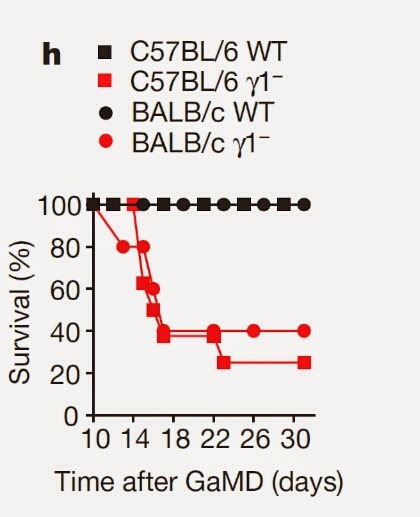IgG antibody family consists of four isotypes: IgG1, IgG2a, IgG2b and IgG3 (IgG1-4, in humans). They differ in their Fc portions. Current knowledge suggests that IgG isotypes have different function depending on a degree of their interactions with complement and FcRs.
New study in journal Nature, however, provided evidence for complement- and FcR-independent function of IgG1 isotype.
This research led by Fred Finkelman at the University of Cincinnati College of Medicine, have analysed immune response of mice deficient for IgG1 isotype (Igγ1- mice). Strangely, immunization with goat anti-mouse IgD anti-serum (GaMD, protein immunogen) led to the death of Igγ1- mice, but not wild-type mice.
The authors showed that this death of Igγ1- mice was caused by kidney insufficiency.
Analysis of immune response to GaMD in Igγ1- mice revealed selective increase in antigen-specific IgG3 isotype and IgM in serum and their deposition in kidney's glomerular capillaries. Interestingly, kidney damage in Igγ1- mice was still present in FcγR1- or FcγR1- and complement C3 double deficient mice.
The authors showed that kidney damage could occur even in wild-type mice by passive injection of antigen (TNP)-specific IgG3 and antigen (TNP-protein). Other IgG isotypes did not induce renal disease.
Importantly, concomitant injection of antigen specific IgG1 and disease-inducing IgG3 could prevent renal disease development independent of complement C3 or inhibitory FcγRIIb.
In summary, these results indicate that induction of antigen-specific IgG1 response during protein immunization prevents the development of type III hypersensitivity. Mechanistically, IgG1 competes for antigen binding with antigen-specific IgG3, thus inhibiting large antigen-antibody complex formations typical for IgG3.
This new knowledge could help to design new treatments for human cryoglobulinemia.
David Usharauli
The authors showed that this death of Igγ1- mice was caused by kidney insufficiency.
Analysis of immune response to GaMD in Igγ1- mice revealed selective increase in antigen-specific IgG3 isotype and IgM in serum and their deposition in kidney's glomerular capillaries. Interestingly, kidney damage in Igγ1- mice was still present in FcγR1- or FcγR1- and complement C3 double deficient mice.
The authors showed that kidney damage could occur even in wild-type mice by passive injection of antigen (TNP)-specific IgG3 and antigen (TNP-protein). Other IgG isotypes did not induce renal disease.
Importantly, concomitant injection of antigen specific IgG1 and disease-inducing IgG3 could prevent renal disease development independent of complement C3 or inhibitory FcγRIIb.
In summary, these results indicate that induction of antigen-specific IgG1 response during protein immunization prevents the development of type III hypersensitivity. Mechanistically, IgG1 competes for antigen binding with antigen-specific IgG3, thus inhibiting large antigen-antibody complex formations typical for IgG3.
This new knowledge could help to design new treatments for human cryoglobulinemia.
David Usharauli





No comments:
Post a Comment